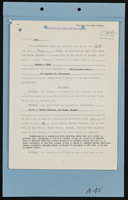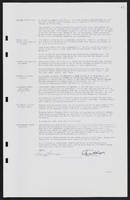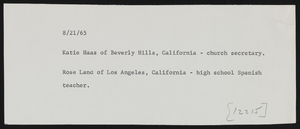Search the Special Collections and Archives Portal
Search Results
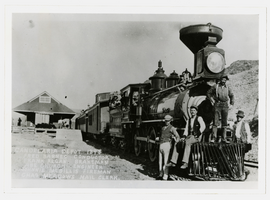
Photograph of men seated on Engine No. 4 at Candelaria Depot, Candelaria (Nev.), 1898
Date
Archival Collection
Description
Caption: l-r Fred Barnes conductor, Frank Regan brakeman, Abe Church engineer, Johnnie McGillis fireman, Charles Meadows mail clerk
Image
Willard Booth oral history interview
Identifier
Abstract
Oral history interview with Willard Booth conducted by Larmaya Kilgore on November 14, 2014 for the African Americans in Las Vegas: a Collaborative Oral History Project. In this interview, Booth discusses his personal history and moving to Las Vegas, Nevada in 1956. He describes his employment at the Sands Hotel and Casino and later at the Thunderbird Hotel and Casino. Booth then talks about segregation issues for African Americans working on the Las Vegas Strip. Later, Booth discusses his involvement with the Second Baptist Church and describes the work he would do for the church. Lastly, Booth describes West Las Vegas and entertainers who would perform at the Carver House, the Moulin Rouge, and the Town Tavern.
Archival Collection
Syphus-Bunker Papers
Identifier
Abstract
The Syphus-Bunker Papers date from 1891 to 1994, with the majority of the collection consisting of correspondence between Mary Etta Syphus and John Mathieson Bunker from 1891 to 1895. The collection also contains correspondence from friends and relatives, and documentation related to Mary Etta Syphus' attendance at Brigham Young Academy Church Normal Training School. Other materials include family history information and two color photographs of family homes. The collection also includes typed transcripts of the correspondence.
Archival Collection
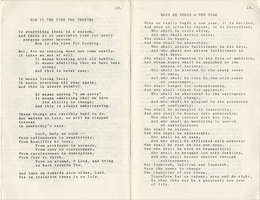
Prayer supplement for High Holy Days at Temple Beth Sholom, 1974
Date
Archival Collection
Description
The booklet includes meditations on faith, prayer, forgiveness and remembrance.
Text
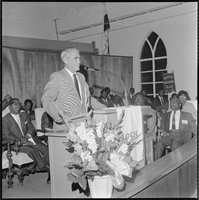
Set of photographs including Boy Scouts at Marble Manor and Convocation
Date
Archival Collection
Description
Photographer's notations: #III-8 June 70, Boy Scouts at Marble Manor for Art Chapman, Convocation 1970.
Image
Audio recording clip of interview with Rev. Marion D. Bennett, Sr. by Claytee D. White, January 12, 2004
Date
Archival Collection
Description
Part of an interview with Rev. Marion D. Bennett, Sr. conducted by Claytee D. White on January 12, 2004. Bennett recalls working with Los Angeles labor organizer Jim Anderson to form the Nevada Voters League.
Sound
Tyrone L. Seals oral history interviews
Identifier
Abstract
Oral history interviews with Tyrone L. Seals conducted by Claytee D. White and Sarah Beth Hawkins on April 25, 2016 and May 16, 2016 for the African Americans in Las Vegas: a Collaborative Oral History Project. In the first interview, Seals discusses his upbringing in Las Vegas, Nevada and growing up in the Westside. He talks about experiencing discrimination, employment limitations, and entertainment on Jackson Street. In the second interview, Seals remembers school integration, organizations for African American women, and protests during the 1960s. Lastly, Seals discusses the significance of religion in the African American community and becoming a pastor.
Archival Collection

